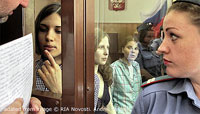Poll suggests over one-third of Russians want parole for Pussy Riot performer

MOSCOW. March 25 (Interfax) – Russians who would like Nadezhda Tolokonnikova, one of the jailed members of the Pussy Riot punk rock band, to be released on parole make up roughly the same proportion as those who want her to serve out her two-year term, an opinion poll suggests.
On March 20, the chairman of the Public Supervisory Commission of the republic of Mordovia, Gennady Morozov, said the administration of the prison in Mordovia where Tolokonnikova is serving her sentence, had sent documents to a local court as part of an appeal for her to be granted parole.
The Levada Center opinion studies firm told Interfax that 35% of those questioned in a survey in mid-March believed Tolokonnikova “has been in jail long enough” and should be let out on parole while 36% thought she ought to stay behind bars until her term expires.
Seven percent believed Tolokonnikova should be freed and acquitted “because Pussy Riot was convicted for no reason at all,” another 8% wanted her to be released immediately because “the sentence was unjustifiably brutal,” while 13% were undecided.
Pussy Riot staged a performance at the Christ the Savior Cathedral on February 21, 2012.
The Khamovnichesky Court found Tolokonnikova, Yekaterina Samutsevich, and Maria Alyokhina guilty of disorderly conduct based on religious enmity and sentenced them to two years in prison each. The women refused to acknowledge their guilt, saying that they did not intend to offend believers. The Moscow City Court later upheld Tolokonnikova’s and Alyokhina’s sentences and suspended Samutsevich’s sentence. The defense teams for the Pussy Riot members filed supervisory appeals on March 5.
Tolokonnikova is serving her sentence at female penitentiary No. 14 in Mordovia and Alyokhina at penitentiary No. 32 in Perm.
The Pussy Riot members filed an appeal with the European Court of Human Rights on February 7, claiming the violation of four articles of the European Convention on Human Rights.
